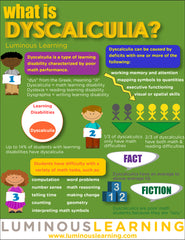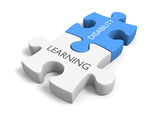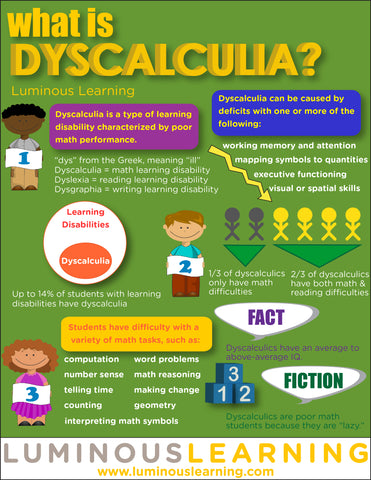Dyscalculia: Your Questions, Answered
What is dyscalculia?
 So you've heard of dyslexia, but what is this dyscalculia? Think of it as the dyslexia of math.
So you've heard of dyslexia, but what is this dyscalculia? Think of it as the dyslexia of math.
Not an exact comparison, but just like dyslexia is difficulty with reading, dyscalculia is difficulty with math. The bad news? Dyscalculia hasn't been researched nearly as much as dyslexia, so there's still a great deal we don't know about how the brain understands mathematics. The good news? It's a growing field and new research, interventions, and ideas about dyscalculia are being developed every year.
What is the history of dyscalculia?
 Dyscalculia was first defined in 1974 by a Czech researched named Ladislav Kosc in an article, "Developmental Dyscalculia." Kosc described dyscalculia as difficulties with mathematical performance despite otherwise normal cognitive functioning. Developmental dyscalculia can be distinguished from acquired dyscalculia, which doesn't manifest in the developing brain but occurs due to a brain injury.
Dyscalculia was first defined in 1974 by a Czech researched named Ladislav Kosc in an article, "Developmental Dyscalculia." Kosc described dyscalculia as difficulties with mathematical performance despite otherwise normal cognitive functioning. Developmental dyscalculia can be distinguished from acquired dyscalculia, which doesn't manifest in the developing brain but occurs due to a brain injury.
What causes dyscalculia?
Dyscalculia is thought to be caused by a dysfunction in the mathematical processing areas of the brain and appears to have some genetic component. Does this mean we can't do anything to remediate math difficulties? Absolutely not! The plasticity of our brains means they are adaptable; environmental stimuli can restructure our brains. In other words, the right kinds of interventions and instruction can significantly improve math performance.
What are examples of meaningful curriculums and interventions?
Here I'll remind you that dyscalculia research is a fairly new and growing field. As more is understood about the dyscalculic mind, more programs will be developed. That said, we highlight a few noteworthy programs that are being used to remediate math difficulties in our resource guide below. Hopefully we'll be able to update this list as more research emerges!
What are the symptoms of dyscalculia?

There isn't a straightforward answer to this question. The precise definition of dyscalculia varies among researchers- some identify visual-spatial deficits while others focus on a core deficit in number facts or procedures. However, based on current research, here are some of the ways dyscalculia manifests:
- poor counting skills (counting by 1s, 2s, 5s, etc. Counting both forwards and backwards)
- slow retrieval or inability to memorize math facts, whether addition, subtraction, multiplication or division
- the use of inefficient calculation strategies, for example, not counting on from the larger addend
- lack of number sense, such as comparing quantities or ordering numbers on a number line
- poor understanding of place value
- difficulty learning and recalling procedures, such as the steps in long division
How do we diagnose dyscalculia?
It is estimated that 3% - 6% of the population have dyscalculia. There isn't a general consensus on what test(s) should be used to identify dyscalculia. If you're a parent or teacher of a student who struggles with mathematics, you should seek out an expert, such as a qualified school psychologist, who can administer various tests. A number of factors need to be ruled out before it's determined that a person has dyscalculia. For example, general low cognitive functioning, lack of exposure to adequate math instruction, or attentional difficulties might not indicate a math disability.


